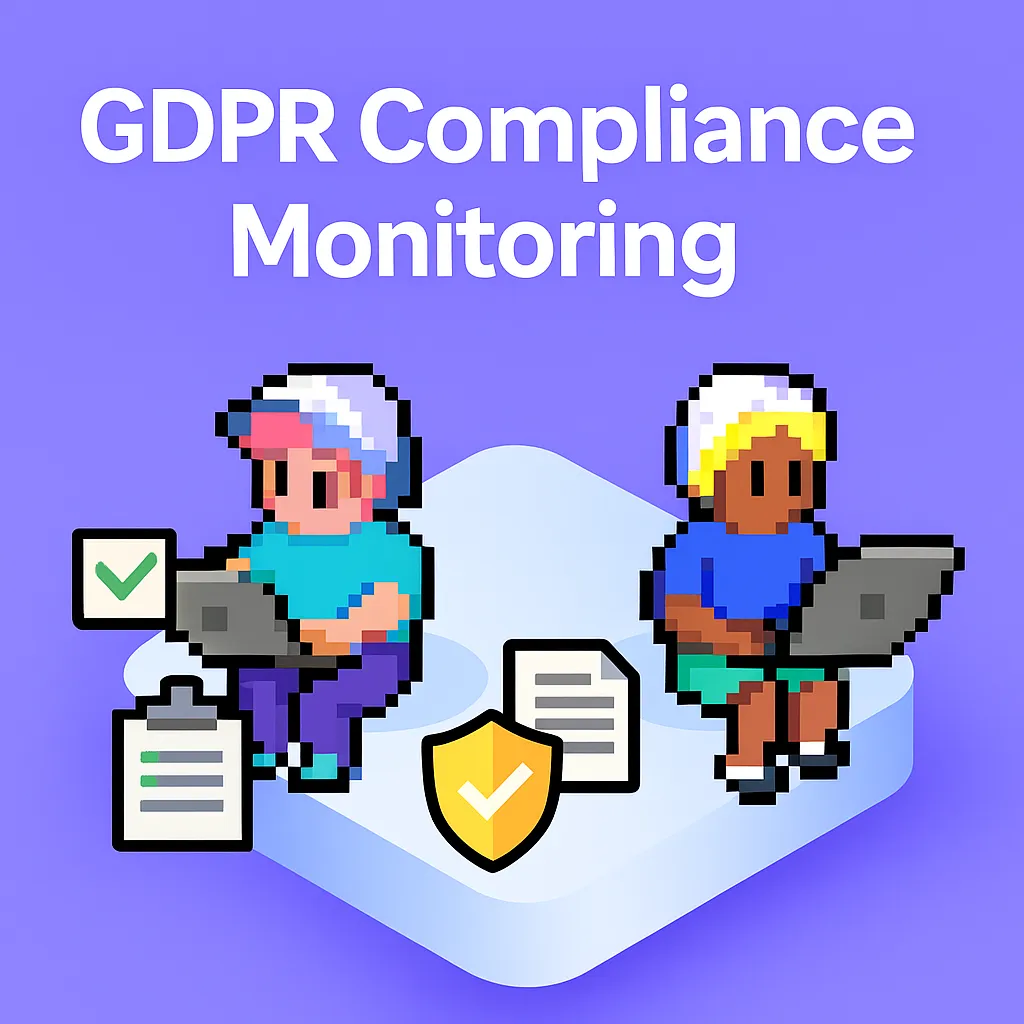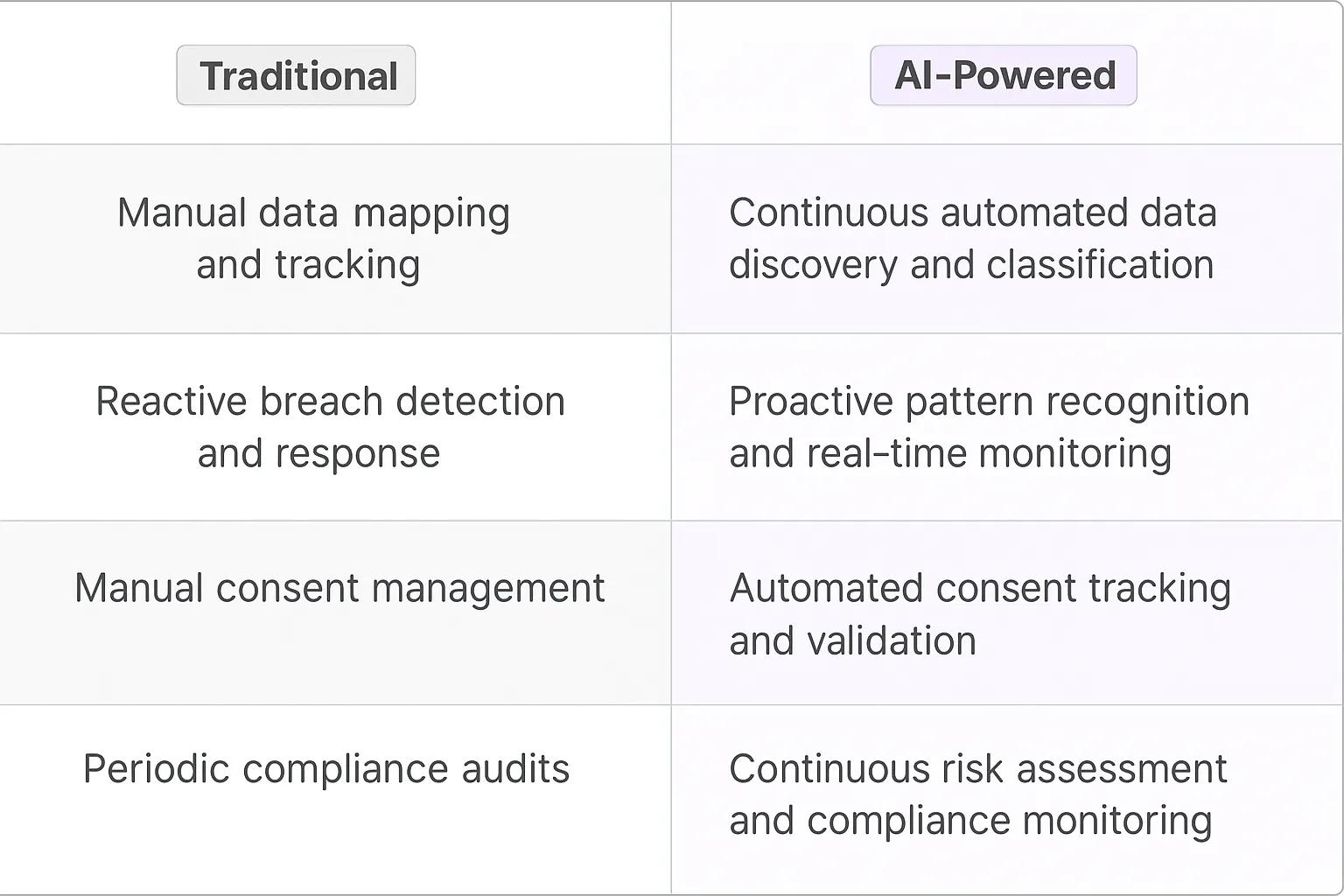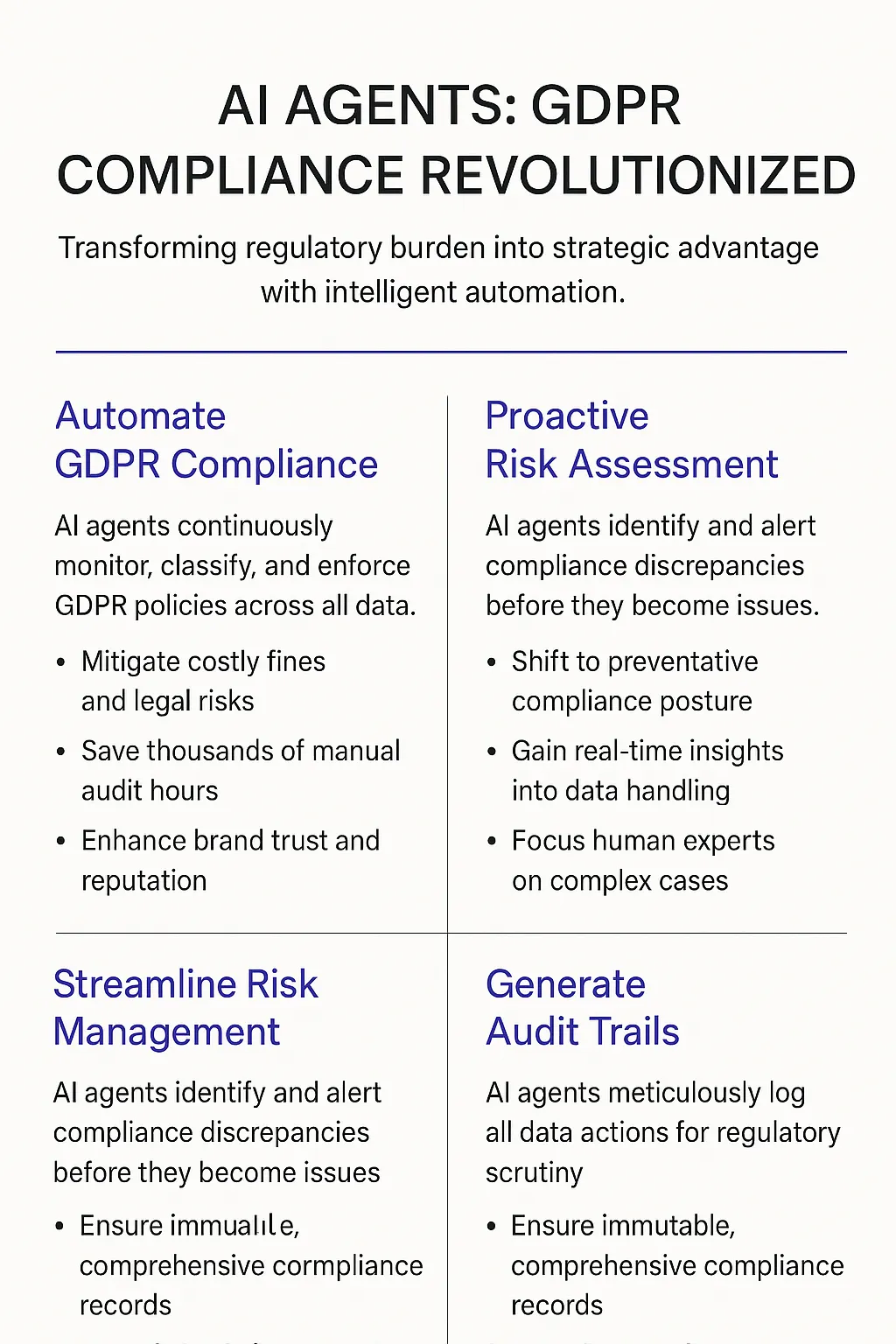GDPR Compliance Monitoring AI Agents
The Evolution of GDPR Compliance Monitoring with AI Agents
What is GDPR Compliance Monitoring?
GDPR Compliance Monitoring is the ongoing process of ensuring an organization's data handling practices align with the General Data Protection Regulation. It's a critical function that involves continuous assessment of data processing activities, consent management, and risk assessment. In the past, this was a manual, labor-intensive task. Now, AI agents are transforming it into a dynamic, real-time operation.
Key Features of GDPR Compliance Monitoring
The key features of GDPR Compliance Monitoring include:
- 1. Data mapping and inventory: Continuously tracking where personal data resides and how it flows through an organization.
2. Consent management: Ensuring proper collection, storage, and respect of user consent across all touchpoints.
3. Risk assessment: Evaluating data processing activities against GDPR requirements to identify potential compliance issues.
4. Breach detection and response: Monitoring for potential data breaches and initiating swift response protocols.
5. Policy compliance checking: Comparing internal policies against GDPR requirements to ensure alignment.
6. Audit trail generation: Creating comprehensive logs of compliance activities for regulatory scrutiny.
AI agents elevate these features by providing 24/7 monitoring, pattern recognition capabilities, and the ability to handle massive datasets with consistency and accuracy.

Benefits of AI Agents for GDPR Compliance Monitoring
What would have been used before AI Agents?
Before AI agents entered the scene, GDPR compliance monitoring was a manual, time-consuming process. Companies relied on teams of legal experts and compliance experts to comb through vast amounts of data, trying to spot potential violations. It was like searching for a needle in a haystack, but the haystack was made of millions of data points, and you had multiple needles to find.
This approach was not only inefficient but also prone to human error. The sheer volume of data made it impossible to catch every potential issue, leaving companies vulnerable to hefty fines and reputational damage. It was a constant game of catch-up, with businesses always one step behind in their compliance efforts.
What are the benefits of AI Agents?
Enter AI agents for GDPR compliance monitoring. These digital teammates are game-changers, transforming how companies approach data protection. Here's why they're so powerful:
1. Continuous monitoring: AI agents don't sleep. They're constantly scanning your systems, identifying potential GDPR violations in real-time. This proactive approach means you're not just reacting to problems; you're preventing them before they occur.
2. Pattern recognition: AI excels at spotting patterns that humans might miss. These agents can identify subtle trends in data handling that could lead to compliance issues, giving you a chance to address them early.
3. Scalability: As your business grows and data volumes increase, AI agents can easily scale to meet the demand. They can handle massive datasets without breaking a sweat, ensuring your compliance efforts keep pace with your business growth.
4. Consistency: Human judgment can vary, but AI agents apply the same rigorous standards across all data. This consistency is crucial for maintaining uniform GDPR compliance across your organization.
5. Cost-effectiveness: While the initial investment might be significant, AI agents quickly pay for themselves. They reduce the need for large teams of compliance experts and minimize the risk of costly GDPR violations.
6. Adaptability: GDPR regulations can change, and AI agents can be quickly updated to reflect new requirements. This flexibility ensures your compliance efforts are always up-to-date.
7. Audit trail: AI agents provide detailed logs of their monitoring activities, creating a comprehensive audit trail. This documentation is invaluable for demonstrating compliance to regulators.
The bottom line? AI agents for GDPR compliance monitoring are not just a nice-to-have; they're becoming essential for any company serious about data protection. They're the difference between playing defense and offense in the compliance game. And in a world where data is the new oil, that's a competitive advantage you can't afford to ignore.

Potential Use Cases of AI Agents for GDPR Compliance Monitoring
Processes
GDPR compliance is a complex beast that keeps many organizations up at night. Enter the GDPR Compliance Monitoring AI Agent - a digital teammate that's about to change the game. This isn't just another tool; it's like having a tireless, hyper-focused compliance expert working 24/7.
One of the key processes where this AI shines is in continuous data mapping. It can crawl through your systems, identifying where personal data resides and how it flows through your organization. This isn't just a one-time audit; it's an ongoing process that adapts as your data landscape evolves.
Another critical process is consent management. The AI can monitor and analyze user interactions, ensuring that consent is properly obtained, recorded, and respected across all touchpoints. It's like having a vigilant guardian of user rights, always on duty.
Risk assessment becomes a dynamic, real-time process with this AI agent. It can continuously evaluate data processing activities against GDPR requirements, flagging potential issues before they become compliance nightmares. This proactive approach shifts the paradigm from reactive firefighting to strategic risk management.
Tasks
When it comes to specific tasks, this AI agent is a powerhouse. It can automatically generate and update data processing records, a task that would typically consume hours of human effort. The AI doesn't just fill in forms; it intelligently compiles information from various sources, ensuring accuracy and completeness.
Data subject access requests (DSARs) often create bottlenecks in organizations. The AI can handle these requests efficiently, automating the process of locating relevant data, compiling it, and preparing it for delivery within the mandated timeframe. It's like having a dedicated DSAR specialist who never takes a coffee break.
Breach detection and response is another area where the AI excels. It can monitor system logs and user activities, using advanced pattern recognition to identify potential data breaches. When it detects an issue, it can trigger predefined response protocols, ensuring swift action and minimizing damage.
The AI can also tackle the mammoth task of policy compliance checking. It can scan through vast amounts of documentation, comparing internal policies against GDPR requirements and flagging discrepancies. This isn't just about finding keywords; it's about understanding context and nuance, something that traditional tools struggle with.
In essence, this GDPR Compliance Monitoring AI Agent isn't just a tool - it's a paradigm shift in how organizations approach data protection. It's the difference between playing defense and offense in the compliance game. And in a world where data is the new oil, this AI is the refinery that ensures your data operations are clean, efficient, and compliant.

Industry Use Cases: GDPR Compliance Monitoring AI Agents
The versatility of AI agents in GDPR compliance monitoring makes them valuable across various industries. Let's dive into some meaty, industry-specific use cases that showcase how AI can transform workflows and processes in the realm of data protection.
These digital teammates aren't just fancy tools; they're becoming essential partners in navigating the complex landscape of data privacy. From finance to healthcare, e-commerce to education, organizations are leveraging AI to stay ahead of regulatory curves and protect user data with unprecedented precision.
What's particularly exciting is how these AI agents are adapting to industry-specific nuances. They're not one-size-fits-all solutions, but rather specialized guardians tailored to each sector's unique data handling challenges. As we explore these use cases, you'll see how AI is redefining what's possible in GDPR compliance, making what was once a daunting task feel almost... dare I say, manageable?
E-commerce: Navigating GDPR with AI-Powered Compliance
The e-commerce industry is a prime candidate for GDPR compliance monitoring AI agents. These digital teammates can transform how online retailers handle customer data, turning a potential regulatory nightmare into a competitive advantage.
Consider a mid-sized e-commerce platform selling across Europe. They're dealing with a constant influx of customer data - names, addresses, payment info, browsing history. It's a goldmine for personalization, but also a ticking time bomb if mishandled.
Enter the GDPR compliance monitoring AI agent. This isn't just some basic checkbox tool. It's a sophisticated system that can:
- Continuously scan databases, flagging any personal data that's being stored without explicit consent
- Monitor data access patterns, identifying potential breaches in real-time
- Automate the process of fulfilling data subject access requests, saving countless human hours
- Ensure data minimization by identifying and purging unnecessary personal information
- Generate comprehensive audit trails for regulators, should they come knocking
But here's where it gets interesting. The AI doesn't just play defense. It becomes a key player in building customer trust. Imagine seamlessly integrating GDPR compliance into the user experience. Customers get crystal-clear consent options, easy access to their data, and the ability to modify or delete it at will - all powered by the AI backend.
This level of transparency and control can become a major differentiator in a crowded e-commerce landscape. It's not just about avoiding fines; it's about turning regulatory compliance into a feature that customers actively seek out.
The end result? An e-commerce platform that's not just GDPR compliant, but one that uses that compliance as a springboard for innovation in user experience and data management. That's the kind of leverage that can propel a company from middle-of-the-pack to industry leader.
Financial Services: AI-Driven GDPR Compliance in Banking
Let's talk about how GDPR compliance monitoring AI agents are reshaping the financial services industry, particularly in banking. This isn't just another tech trend - it's a fundamental shift in how banks handle customer data and privacy.
Banks are data powerhouses. They're sitting on mountains of sensitive personal information - from transaction histories to credit scores. But with GDPR, this data goldmine can quickly turn into a regulatory minefield. That's where AI comes in, not just as a band-aid solution, but as a core component of modern banking infrastructure.
Consider a multinational bank operating across the EU. They're juggling millions of customer accounts, each with its own complex web of consents, preferences, and data usage rights. Manually managing this is like trying to count grains of sand on a beach - theoretically possible, but practically insane.
A GDPR compliance monitoring AI agent in this context becomes the bank's digital privacy guardian. It's constantly at work, performing tasks like:
- Real-time consent management across all customer touchpoints
- Automated data classification and tagging to ensure proper handling of sensitive information
- Predictive analytics to identify potential compliance risks before they become issues
- Intelligent data minimization, ensuring only necessary data is retained and processed
- Dynamic privacy policy updates based on changing regulations and customer interactions
But here's where it gets really interesting. The most forward-thinking banks aren't just using AI for defense - they're turning it into a customer-facing feature. Imagine a banking app where customers have granular control over their data, powered by AI. They can see exactly how their information is being used, modify permissions on the fly, and even get AI-generated insights on their privacy choices.
This level of transparency and control creates a new kind of relationship between banks and their customers. It's no longer just about storing money - it's about being a trusted steward of personal data. In a world where data breaches make headlines weekly, this trust becomes a massive competitive advantage.
The banks that get this right aren't just avoiding fines - they're creating a new category of "privacy-first banking" that could redefine the industry. It's a classic example of turning a regulatory challenge into a product innovation opportunity.
As we move into an era where data is as valuable as currency, the banks that master GDPR compliance through AI won't just be following the rules - they'll be writing the playbook for the future of financial services.
Considerations
Technical Challenges
Implementing a GDPR Compliance Monitoring AI Agent is like trying to teach a robot to navigate a legal minefield. The technical hurdles are no joke. First off, you're dealing with massive amounts of data across various systems and formats. Your AI needs to be a polyglot, speaking the language of databases, cloud storage, and legacy systems alike.
Then there's the issue of data classification. The AI must accurately identify personal data, which is trickier than it sounds. Is an IP address personal data? Sometimes. What about a device ID? It depends. The AI needs to understand context and nuance, something that doesn't come naturally to machines.
Another technical headache is keeping up with the ever-evolving interpretation of GDPR. Your AI can't just be a static rule-enforcer; it needs to learn and adapt as new court decisions and regulatory guidance emerge. This requires sophisticated machine learning models that can understand legal text and apply it to real-world scenarios.
Operational Challenges
On the operational side, things get even messier. You're essentially asking an AI to be a compliance officer, a role that traditionally requires human judgment and interpersonal skills. How do you ensure that the AI's decisions are trusted and followed by human employees?
There's also the question of false positives and negatives. Set your AI's sensitivity too high, and you'll drown in alerts about non-issues. Too low, and you might miss crucial compliance breaches. Finding that sweet spot is an ongoing process that requires constant fine-tuning.
Let's not forget about the human factor. Employees might view the AI as Big Brother, constantly watching over their shoulder. This could lead to resistance or attempts to circumvent the system. You need a solid change management strategy to get buy-in from all levels of the organization.
Finally, there's the irony of using an AI to ensure data privacy. You're essentially creating a system that needs access to all the data it's supposed to protect. How do you ensure that the AI itself doesn't become a point of vulnerability? It's like hiring a security guard who needs the keys to every room in the building.
Implementing a GDPR Compliance Monitoring AI Agent is a complex dance of technology, law, and human behavior. It's not for the faint of heart, but for those who pull it off, the rewards in terms of risk mitigation and operational efficiency can be substantial.
The Future of Data Protection: AI Agents as Strategic Assets
GDPR Compliance Monitoring AI Agents are more than just a technological advancement; they're a paradigm shift in data protection. They're turning what was once a daunting regulatory challenge into a strategic advantage. For businesses serious about data privacy, these AI agents aren't just nice-to-have - they're becoming essential.
The real power of these AI agents lies in their ability to adapt to industry-specific needs, from e-commerce to banking. They're not replacing human expertise, but augmenting it, allowing organizations to stay ahead of regulatory curves with unprecedented precision.
As we move into an era where data is as valuable as currency, mastering GDPR compliance through AI isn't just about following rules - it's about writing the playbook for the future of data-driven business. The organizations that get this right won't just avoid fines; they'll build deeper trust with their customers and gain a significant edge in the market.
The journey of implementing these AI agents comes with its challenges, both technical and operational. But for those who navigate these hurdles successfully, the rewards in risk mitigation, operational efficiency, and competitive advantage are substantial. In the end, GDPR Compliance Monitoring AI Agents aren't just changing how we approach data protection - they're redefining what's possible in the realm of privacy-first business practices.













